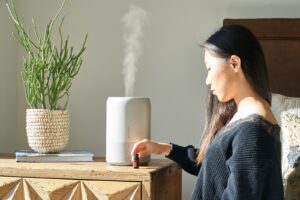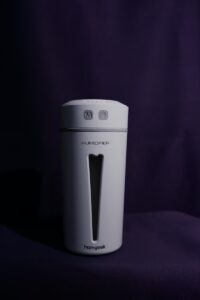
Humidifiers are a great way to improve indoor air quality, particularly during the dry winter months. But, as with any home appliance, they can create noise. This can be particularly troublesome if you’re using a humidifier in your bedroom, as the noise can make it difficult to sleep. So, how can you reduce the noise? “How To Dampen A Humidifier Noise”
Fortunately, there are several ways to dampen humidifier noise. Those ways include using a noise machine, using distilled water, placing the humidifier on a soft surface, and so on.
In this article, we’ll elaborate more on the most effective methods to dampen humidifier noise and also talk about the causes.
Contents
What causes humidifier noise?
Humidifiers are designed to add moisture to the air, achieved by forcing air through a filter or a wick saturated with water. The noise created by a humidifier is typically caused by the following:
The electrical components
Electronic components in a humidifier may include a motor, control panel, or other electrical circuits. Here are some possible reasons why electronic components can cause noise in a humidifier:
- Motor noise
A humidifier motor can produce noise when it is running. A motor that is worn or damaged can produce a grinding or whining noise. A motor that is not properly balanced can produce a vibration noise. The bearings of the motor can also produce a buzzing or humming noise when they wear out.
A motor that’s not properly balanced can produce a vibration noise. If the motor is the source of the noise, it may be necessary to replace it or seek assistance from a professional technician.
- Control panel noise
Some humidifiers have control panels that can produce noise when they are operating. For example, the control panel may beep or emit a clicking noise when the user adjusts the settings.
This can be caused by a malfunctioning circuit or component within the control panel. If the control panel is the source of the noise, it may be necessary to replace it.
- Transformer noise
Some humidifiers use transformers to convert the electrical current from the wall outlet to the correct voltage for the humidifier’s electronic components. These transformers can produce a humming noise when they are operating.
Transformer noise is typically a low-pitched humming sound, which may be constant or intermittent. This noise can be caused by the vibration of the transformer core, the transformer windings, or the mounting hardware.
The sound of the fan
Most humidifiers use a fan to circulate the moist air into the room. The sound of the fan can be heard as a low humming or buzzing noise.
The fan may also produce a higher-pitched whirring noise if it’s unbalanced or if something is obstructing its rotation. In some cases, the fan blades themselves may be vibrating or making contact with other parts of the humidifier, which can produce additional noise.
Water droplet noise
When water passes through the humidifier, it can create droplets that can produce a tapping or splashing sound as they hit the humidifier’s surfaces.
This can happen when the water level in the humidifier is too high or when the water is agitated by the fan or other internal components.
Defective parts
Defective parts in a humidifier can cause a variety of issues, including noise. If parts like the pump, valve, filter, or sensor are defective, it could also cause the humidifier to make a noise. And for the noise to be reduced, it will be best if you repair the parts that are faulty in the humidifier.
Also read: Why is it difficult to block sound waves?
How to soundproof a humidifier

Now that we know what causes humidifier noise, let’s look at some ways to dampen it.
Choose a quiet humidifier
If you haven’t bought a humidifier yet, consider choosing one that’s designed to be quiet. Many modern humidifiers are designed with noise reduction in mind, and they use quieter fans and motors. Look for humidifiers that advertise themselves as being “ultra-quiet” or “whisper-quiet.”
Place the humidifier on a soft surface
Placing your humidifier on a soft surface can help to dampen vibrations and reduce noise. Try placing your humidifier on a towel, rug, or carpet. If you have a hard floor, consider placing a rubber mat or foam pad underneath the humidifier.
Use a humidifier silencer
A humidifier silencer is a device that’s designed to reduce the noise created by a humidifier. These devices typically attach to the outside of the humidifier and work by absorbing sound waves. They’re particularly effective at reducing high-pitched noises, such as the sound of a fan.
Adjust the fan speed
If your humidifier has adjustable fan speeds, try lowering the speed to reduce noise. The slower the fan spins, the quieter it will be. Keep in mind that lowering the fan speed may reduce the humidifier’s effectiveness at adding moisture to the air.
Keep the humidifier clean
A dirty humidifier can create more noise than a clean one. Over time, mineral deposits and other buildups can accumulate on the humidifier’s components, causing the fan and other parts to work harder and create more noise. Be sure to follow the manufacturer’s instructions for cleaning your humidifier regularly.
Use distilled water
Using distilled water in your humidifier can help to reduce noise. Tap water can contain minerals that can create buildup and cause the humidifier to work harder. Distilled water doesn’t contain these minerals, so it’s less likely to create noise.
Use a noise machine
If you’re having trouble sleeping due to your humidifier’s noise, consider using a noise machine. These devices create a soothing background noise that can help drown out your humidifier’s sound. Look for noise machines that offer a variety of sounds, such as white noise, ocean waves, or rain.
Repair the defective parts
If you notice that the noise from the humidifier is caused by a defective component, then you can stop the noise by repairing that component. In most cases, you might have to purchase that component and insert it into the humidifier.
FAQs
Is It bad to have the humidifier on all night?
It is generally not bad to have a humidifier on all night, but it depends on the specific circumstances and the type of humidifier you are using.
If you live in a dry climate or your home is heated with forced air heating, using a humidifier can help add moisture to the air and make the environment more comfortable. In fact, some people find that using a humidifier at night helps them sleep better by reducing dryness in the throat and nasal passages.
However, if the humidifier is not properly maintained or cleaned regularly, it can become a breeding ground for bacteria and mold, which can cause health problems.
Additionally, if the humidifier is set too high, it can create excessive moisture in the air, which can lead to mold growth or other issues. It’s important to follow the manufacturer’s instructions for your specific humidifier and to clean it regularly according to those instructions.
Why should you use a humidifier?
There are several reasons why you might want to use a humidifier:
Relieve dry skin and lips
Using a humidifier can help combat dry skin and lips, which can be especially beneficial during dry winter months or in areas with low humidity.
Alleviate dry nasal passages and throat
Dry nasal passages and throat can cause discomfort, irritation, and even nosebleeds. A humidifier can add moisture to the air, which can help alleviate these symptoms.
Reduce snoring
Dry air can contribute to snoring, and using a humidifier can help keep the nasal passages and throat hydrated, reducing the likelihood of snoring.
Ease asthma and allergy symptoms
Dry air can aggravate asthma and allergy symptoms, and using a humidifier can help keep the airways moist, making it easier to breathe.
Improve overall air quality
A humidifier can help improve the overall air quality in your home by reducing the amount of dust and other allergens in the air.
Is there a device that cancels noise?
Yes, there are devices that are specifically designed to cancel noise, known as noise-canceling devices. These devices work by producing sound waves that are opposite in frequency and phase to the unwanted noise, effectively canceling it out.
The most common type of noise-canceling device is a noise-canceling headphone. These headphones use microphones to pick up external noise and then produce sound waves that are precisely timed to cancel out the unwanted noise.
There are also standalone noise-cancelling devices such as white noise machines and soundproof curtains that can help reduce or eliminate unwanted noise.
It’s important to note that while noise-canceling devices can be effective in reducing unwanted noise, they may not completely eliminate it.
Additionally, some people may experience discomfort or headaches when using noise-canceling devices for extended periods of time. It’s always a good idea to use these devices responsibly and follow the manufacturer’s instructions.
Conclusion – How To Dampen A Humidifier Noise
In this blog post, we have been able to list and explain the causes of humidifier noise and how to dampen it. We hope all your questions have been answered in this blog post. If not, kindly put down the other questions you have in the comment section below.
